Choosing between a fixed and variable interest rate is an important decision when securing a home loan with a low deposit. Each option has its pros and cons, and understanding them can help you make the best choice for your financial situation. This blog will explore the differences between fixed and variable rates and how they impact home loans with low deposits.
Understanding Fixed and Variable Rates
Fixed Rates
A fixed-rate home loan means your interest rate remains the same for a set period, typically between one to five years. This provides certainty and stability, as your repayments will not change during the fixed period.
Variable Rates
A variable-rate home loan means your interest rate can change over time based on market conditions. This can result in fluctuating repayments, which can be both a risk and an opportunity.
Pros and Cons of Fixed Rates for Low Deposit Home Loans
Pros
- Stability: With a fixed rate, your repayments remain the same, making it easier to budget.
- Predictability: You know exactly how much you need to pay each month, which can help with financial planning.
- Protection from Rate Increases: If interest rates rise, your repayments won’t increase during the fixed period.
Cons
- Less Flexibility: Fixed-rate loans often come with fewer features, such as the ability to make extra repayments or access a redraw facility.
- Break Costs: If you need to sell your home or refinance before the fixed period ends, you may incur break costs.
- Miss Out on Rate Drops: If interest rates fall, you won’t benefit from the lower rates during the fixed period.
Pros and Cons of Variable Rates for Low Deposit Home Loans
Pros
- Flexibility: Variable-rate loans often come with more features, such as the ability to make extra repayments, access a redraw facility, and use an offset account.
- Benefit from Rate Drops: If interest rates fall, your repayments will decrease, saving you money.
- No Break Costs: You can refinance or sell your home without incurring break costs.
Cons
- Uncertainty: Your repayments can increase if interest rates rise, making it harder to budget.
- Higher Repayments: If interest rates increase, your repayments will go up, potentially straining your finances.
- Market Risk: You are exposed to market fluctuations, which can be unpredictable.
Which is Better for Low Deposit Home Loans?
Fixed Rates
Fixed rates can be a good option for home loans with low deposits if you value stability and predictability. If you’re concerned about rising interest rates and want to lock in a low rate, a fixed-rate loan can provide peace of mind. This is particularly useful if you’re on a tight budget and need to know exactly what your repayments will be each month.
Variable Rates
Variable rates can be a better option if you’re comfortable with some uncertainty and want the flexibility to make extra repayments or access features like an offset account. If you believe interest rates will fall or want the ability to refinance without break costs, a variable-rate loan might be more suitable.
Considerations for Low Deposit Home Loans
Financial Situation
Consider your current financial situation and how changes in interest rates might affect your ability to make repayments. If you’re on a tight budget, the stability of a fixed rate might be more appealing. If you have some financial flexibility, a variable rate could offer more benefits.
Market Conditions
Look at the current market conditions and interest rate trends. If interest rates are low and expected to rise, locking in a fixed rate might be advantageous. If rates are high and expected to fall, a variable rate could save you money in the long run.
Loan Features
Consider the features you need in a home loan. If you want the ability to make extra repayments, access a redraw facility, or use an offset account, a variable-rate loan might be more suitable. If these features are less important to you, a fixed-rate loan could be a better fit.
Conclusion
Choosing between a fixed and variable rate for a home loan with a low deposit depends on your financial situation, market conditions, and personal preferences. Fixed rates offer stability and predictability, making them a good choice if you’re concerned about rising interest rates. Variable rates provide flexibility and the potential to benefit from rate drops, making them suitable if you’re comfortable with some uncertainty. Working with a mortgage broker can help you navigate these options and find the best solution for your needs. With the right approach, you’ll be well on your way to securing a home loan with a low deposit that suits your financial situation.


